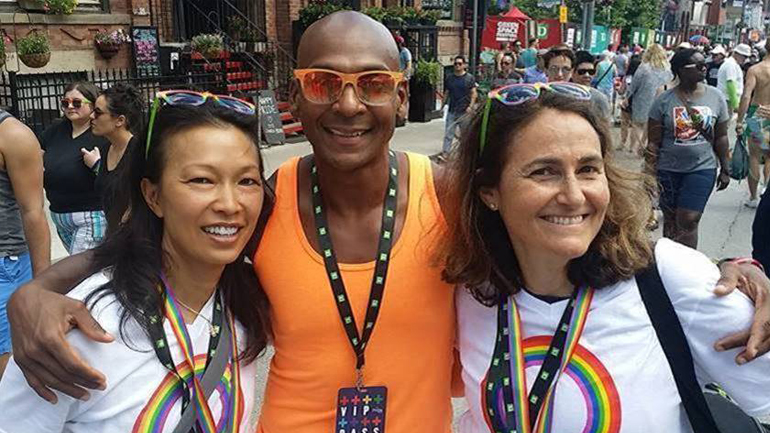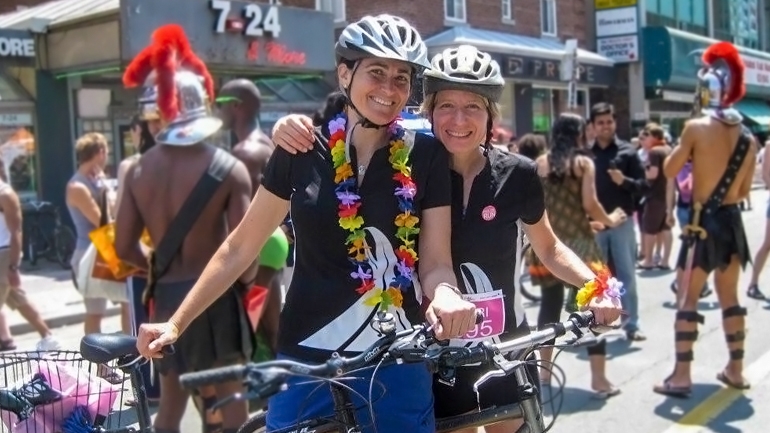This year marks the 50th anniversary of the Stonewall Riots, a defining moment in the collective consciousness of the LGBTQ2+ community. Coincidentally, I am also celebrating a 50th anniversary this year. Five decades ago, I also began my own coming out journey.
June 27, 1969
I was 13 years-old. My family was gathered around the TV watching the CBC evening news, when the newscaster reported that homosexuality had been decriminalized. Until that moment, I had never heard the word 'homosexual' (and people weren't using the word 'gay' yet). Curious, I turned to my mother and asked what a homosexual was. As she answered, I realized the newscaster was talking about people like me.
With that sudden realization, my world changed. I learned that there were other people like me, and that until that day we had been illegal. I could tell from the tone of the broadcast that even after decriminalization we were still viewed by many as social outcasts who could be ridiculed, pitied or despised by "normal" people.
What also happened in that moment, was that I went from being a pretty good kid who did well in school and never got into any serious trouble to someone with a dark secret. I now had something to hide that made me different from everyone else I knew.
Coming out
I came out to my family first. They were more supportive than many parents in those days. They didn't kick me out of the house or take me to conversion therapy (like some of my friends endured as I found out years later), but they did express grave concern for my future and asked me to see a psychiatrist. For years they held out hope that this was a phase.
Gradually, I came out to friends whom I trusted, and when I started working I came out to selected colleagues. No matter how many times I came out during those early years, it was always terrifying. I would feel physically sick with the fear of it.
READ: My journey as an authentic leader
A turning point for me was when I was asked to start the first "coming out group" for women at the University of Toronto. I led that group for four years, and not only developed lifelong friendships, but I became more secure in my own identity by helping others on their journey. This is when I realized that I could be a positive role model for others.
My double life at work
But when I started working in banking in 1981, I was faced with a conundrum. I had become quite comfortable being out in other environments, but something about a corporate one told me to proceed with caution. Maybe it was the close colleague who told me he thought all the gay people should be "lined up and shot." It just didn't feel safe to come out yet.
Of course, there were other colleagues who were experiencing this too, and most of us dealt with this by putting on a completely straight persona at work. I tried that for a while, but it never felt good to me. Hiding part of myself made it harder to form the kind of authentic and trusting connections that I wanted to have with my colleagues.
READ: LGBTQ2+ inclusion - The next hurdle we must overcome is ourselves
In the mid 1980s, I started coming out to close colleagues, but it was still an anxious time because I always had to remember who knew and who didn't (which was exhausting). I was also partially relieved, however, because at least I was starting to be myself with some of the people at work.

(Far right) Amy Hanen, Associate Vice President, Citizenship and Community Advisory, says public speaking helped her realize that she could act as a role model to help fight discrimination.
Not illegal, but not safe
Despite homosexuality starting to be decriminalized in 1969, it was still legal to discriminate against gay people until the mid-1990s. We all knew that we could be fired or refused housing or other services just because we were gay, so I lived with the fear that if I told the wrong person I could lose everything I had worked so hard for.
A milestone change to the Canadian Human Rights Act
Finally in 1995, the Supreme Court of Canada ruled (in the Egan case) that it was no longer legal to discriminate against someone for being gay—a huge legal milestone, but social attitudes continued to change gradually.
In the late 1990s I started speaking publicly as a lesbian both at work and on my own time. This marked a new stage in my coming out journey and many people told me that I was the first gay person they had ever met. I realized that by coming out I was contributing to the change in attitudes that we so desperately needed, and this made me feel bolder.
'I am sorry. We are sorry.'
In 2005, Bill C-38 instituted marriage equality in Canada and I really believe that accelerated the shift in social attitudes toward the LGBTQ2+ community (the U.S. followed suit in 2015.) Two years later, gender identity and gender expression were added to the Canadian Human Rights Act, and a formal apology to Canadian LGBT people by Prime Minister Justin Trudeau to those of us who lost careers, dignity, or had their lives shattered, also recognized the inequities and oppression many faced.
Thinking back to my early coming out journey, I would never have anticipated the amount of legal and social change I would witness in my lifetime. I'm also very lucky that it's now part of my job to help TD deliver on the values that are so close to my heart through its corporate citizenship platform, The Ready Commitment.
To my 13 year-old self
If I could go back and give some perspective to the frightened 13 year-old I once was, I would tell her to stay true to herself. I would tell her that the world will eventually catch up to what she already knows (that love is love.) And I would add that one day she will work for an organization where her perspective and experiences will be valued and used to create a more positive and inclusive life for others.
